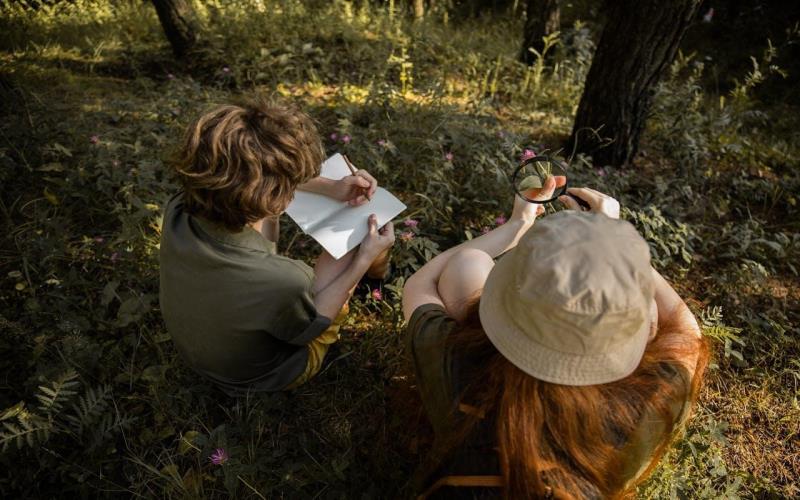Children are real sponges, and from a very early age, they are able to pick up some of the most complex and demanding information and reuse them for greater purposes. As parents, it’s our job to act as teachers, promoters, and tour guides through life in order to teach them the essence of life. And that’s respect and mindfulness towards every human being and toward nature and the environment.
With that in mind, teaching children about sustainability and the importance of looking after the planet Earth from an early age is the essence of creating and maintaining a strong bond with nature. Children are the citizens of the future, hence, it’s our pivotal job to help them acquire a meaningful understanding of how to be environmentally responsible and what steps they need to take to save and protect the planet. Promoting eco-friendly mindsets is not a hard thing to achieve, but it is a bit of a lengthy process. Here are the main reasons why you should start teaching children about sustainability ASAP.
Strengthening a critical mindset
Children usually tend to follow in the footsteps of their parents, and if the parents showcase the vast importance of looking beyond the materialist values in life, the child will also appreciate other things. For instance, they could see that their old cotton t-shirt is too small, and instead of throwing it away, they would either recycle it or donate it. Teaching children sustainable ways of living in the early years enables them to create and develop a critical mindset. By having a firm critical mindset and understanding the importance of reusing and recycling materials to prevent overproduction and the increased usage of carbon emissions, they would understand that they are one step closer to saving the planet.
Promoting healthier lifestyle
Children tend to put numerous items in their mouths to discover the world around them. Hence if you were to purchase toys that contain a higher percentage of BPA, you may risk jeopardizing your child’s health and damaging the ecosystem. Thus, switching to a more sustainable lifestyle, ditching damaging plastic, opting for wooden and more eco-friendly toys, aiming to plant your garden, and generally going for more sustainable life choices, would advance your lifestyle. Monkey see, monkey do. Leading a sustainable (read: healthier) lifestyle and practicing eco-friendly notions throughout your household, the children from a young age would copy those behaviors and only reap the benefits of living more sustainably.
Lasting changes led by examples
As children learn faster and more easily than grown-ups, their curiosity must be met regularly. If you are overwhelmed with daily obligations and workload, sending your children to an environmentally friendly kindergarten is another way to ensure someone would carry out your sustainability practices. One such education center, Insight Early Learning, has a clear mission of implementing sustainability practices into their teaching techniques while having fun. What’s more, at the early learning center, besides learning about sustainable agricultural processes and the benefits of growing your fruits and vegetables and advancing nutrition at an early age, teachers focus on creating lasting changes. The sole reason that kids adhere to what they are taught at a kindergarten from a young age is consequently seen in other areas of life.
Creating a mindful habit
If you start incorporating a set of small but effective sustainability methods into your child’s development, they will quickly implement those methods and transform them into a mindful habit. Aim to teach a child every day something, or at least weekly, for example, how to recycle, how to compost, the importance of not throwing garbage on streets, turning off lights or tap water when not using, and so on, and they will acquire these things with ease and turn them into a habit. So, when children start completing a certain action such as creating compost out of leftover food or recycling plastic, it would slowly but surely become a habit after a certain point.

Instill valuable skills into little minds
By encouraging young minds to be more attentive towards Mother Nature, you would undoubtedly help them adopt environmentally conscious habits and work towards creating a better future for our planet. Another extremely significant benefit of teaching children sustainability is advancing their cognitive capabilities. Teaching them about the importance of sustainability helps them actively develop critical thinking skills and boost problem-solving abilities. If both parents and children work towards making our world a healthier place to live in and adopting sustainable practices on a daily basis, such as noticing how garbage cans are full, we would create a safe and healthy environment.
Implement creative and healthy sustainability practices
Children adopt new skills and practices in various ways. The first way usually involves following an example. As a parent, or a teacher, aim to engage children in various discussions about the vitality of sustainable practices such as creative edible gardens, reusing and repurposing gaming materials, getting involved in community eco-friendly projects, etc. There are plenty of other creative activities and practices you can adopt to teach children to act in a sustainable manner like going hiking, bonding with nature, playing fun sustainable games, starting a plant garden, and similar. Therefore, integrating sustainability practices with creative and exciting artsy activities would intrigue children about sustainability.
Teaching children about sustainability from an early age will create a lasting trace in their young minds and make them better consumers in the future. Making the new generation aware of the importance of protecting the world we live in might help the current society alter their existing habits now and work towards their improvement.

